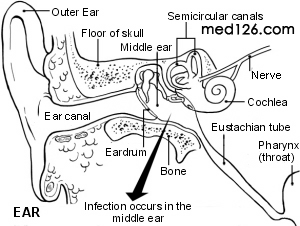
What is an ear infection?
An ear infection means that the middle ear is infected. The middle ear is the eardrum and the small space behind the eardrum. An ear infection is sometimes called 'acute otitis media'. A separate leaflet deals with infection of the ear canal (otitis externa).
How does an ear infection occur?
The small space behind the eardrum in the middle ear is normally filled with air. It is connected to the back of the throat by a tiny channel called the Eustachian tube.
The middle ear space sometimes becomes filled with mucus (fluid), often during a 'cold'. The mucus may then become infected by bacteria or viruses. Children with glue ear who have mucus behind their eardrum are more prone to ear infections. Sometimes an ear infection occurs 'out of the blue' for no apparent reason.

A note about earache
Earache is a common symptom of ear infection. However, not all earaches are caused by an ear infection. If a child has earache but is otherwise well, an ear infection is unlikely. A common cause of mild earache is a build up mucus in the middle ear after a cold. This usually clears in a few days. Sometimes pain that you can feel in the ear is due to 'referred pain' from other causes such as teeth problems.
What is the treatment for an ear infection?
Most bouts of ear infection will clear on their own without treatment within 2-3 days. The immune system can usually clear bacteria or viruses that cause ear infections. However, treatments that may be advised include the following.
Painkillers
If the ear infection is causing pain then give painkillers to children regularly until the pain eases. For example, paracetamol (Calpol, Disprol, etc) or ibuprofen. These drugs will also lower a raised temperature which can make a child feel better. If antibiotics are prescribed (see below), you should still give the painkiller as well until the pain eases.
Antibiotics - are prescribed in some cases only
Antibiotics are not advised in most cases. This is because in most cases the infection clears within 2-3 days on it's own. Also, it is best not to take antibiotics unless needed as side-effects such as diarrhoea can sometimes be a problem. Antibiotics are more likely to be prescribed if:
When an ear infection first develops it is common for a doctor to advise a 'wait and see' approach for 2-3 days. This means just using painkillers to ease the pain, and to see if the infection clears. In most cases, the infection clears. However, if it does not then antibiotics may then be used. 醫(yī)學(xué)全在線(xiàn)www.med126.com
What are the possible complications from an ear infection?
It is common for some mucus to remain behind the eardrum after the infection clears. This may cause dulled hearing for a while. This usually clears within a week or so, and hearing then returns to normal. Sometimes the mucus does not clear properly and 'glue ear' may develop. Hearing may then remain dulled. See a doctor if dulled hearing persists after an ear infection has gone.
If the eardrum perforates, then it usually heals over quickly once the infection clears. However, in some cases, the perforation remains long-term and may need treatment to fix it.
If a child is normally well then the risk of other serious complications developing from an ear infection is small. Rarely, a serious infection of the bone behind the ear develops from an ear infection. This is called mastoiditis. Very rarely, the infection spreads deeper into the brain. See a doctor if a child becomes more ill, does not improve over 2-3 days, or develops any symptoms that you are not sure about.
Will it happen again, and can it be prevented?
It is quite common for children to have two or more bouts of ear infection throughout childhood. In most cases, there is nothing you can do to prevent the infection form occurring. However, there is some evidence to suggest that an ear infection is less likely to develop:
Occasionally, some children have recurring bouts of ear infections close together. If this occurs, a specialist may advise a long course of antibiotics to prevent further bouts occurring.